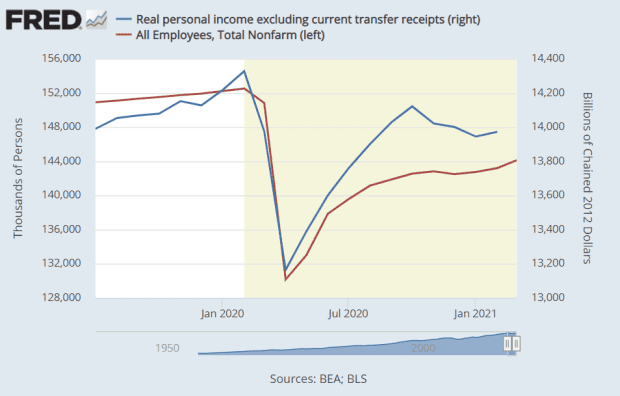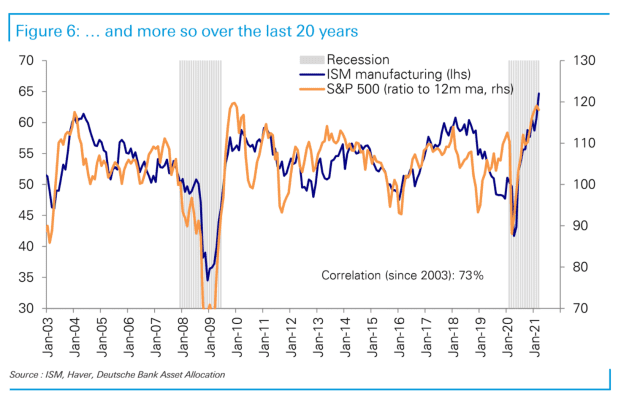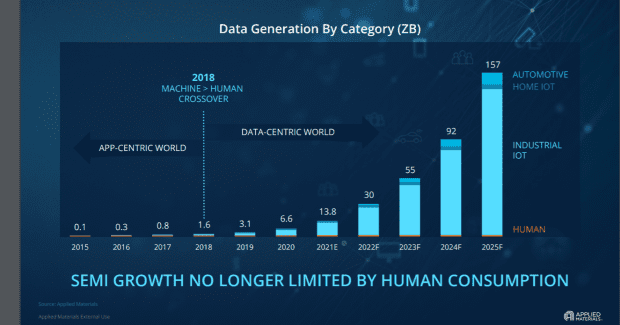The organization that in the U.S. says whether the economy is in a recession or not seems to be asleep on the job.
The National Bureau of Economic Research defines a recession as the period between a peak of economic activity and its subsequent trough, or lowest point. There is no debate that the NBER was correct in calling the last cycle’s peak in February 2020, but the bottom was, if you look at jobless claims, late April, and no later than May if you look at employment or personal income.

Employment and personal income are well above the troughs.
For markets, there is significance to when the economy is in expansion or recession. According to research from Deutsche Bank, growth, as measured by the Institute for Supply Management’s manufacturing index, typically peaks 10 to 11 months after a recession ends. That would be right now, if you go by the NBER’s definition of recession and not its stubborn refusal to say it.
Over the last 20 years, there has been a 73% correlation between the annual, rolling gains of the S&P 500 SPX, +0.07% and the level of the ISM manufacturing index. That makes sense — you would expect growth assets, like stocks, to be correlated to measures of economic growth.

According to the Deutsche Bank numbers, the S&P 500 sold off around growth peaks by a median of 8.4%, and dropped by a median of 5.9% when the ISM flattened instead of fell. And the timing of these drops was soon from the peak — usually two weeks after, lasting six weeks in total.
So when that peak comes is important. And Deutsche Bank says it will come in the next three months — not a huge shock given that the March reading registered 64.8%, a 38-year high.
“As growth peaks over the next three months, we expect discretionary investors to pare their positioning from extremely elevated levels, and see retail investors as unlikely to buy the dip. Using the historical experience as a guide argues for a near -6% pullback if growth flattens out near the peak, a bigger -8.4% pullback on an inverted-V in growth,” said strategists led by Binky Chadha.
From there, though, equities may rally back, they say. And the key in the late summer and autumn will be whether inflation sustains or accelerates, and how the Federal Reserve reacts.
Fed minutes on deck
The minutes from the last Fed interest-rate decision will be released at 2 p.m. Eastern. The markets will focus on any discussion surrounding the timing of slowing the rate of bond purchases, and how “substantial further progress” toward maximum employment and price stability goals — the Fed’s condition for tapering — is defined.
Jeff Bezos, the chief executive of internet retailing giant Amazon AMZN, +2.02%, supports an increase in corporate taxes to pay for increased infrastructure spending, The Wall Street Journal reported, citing a company memo. JPMorgan Chase JPM, +1.39% Chairman and CEO Jamie Dimon used his annual letter to argue for tighter regulation of non-bank competitors, as he called for tax breaks to be eliminated and said higher taxes on the wealthy would be justified.
Cruise operators including Carnival CCL, +1.85% and Norwegian Cruise Line Holdings NCLH, +1.90% extended Tuesday’s gains in premarket trade, on optimism over when bookings can continue. Irish discount airline Ryanair Holdings RYAAY, -1.85% said European travel restrictions will mean passenger traffic at the low end of its guidance.
Industrial conglomerate Toshiba 6502, +18.28% jumped in Tokyo trade after receiving a proposal to be bought by CVC Capital Partners in what would be one of the largest private-equity deals of all time if completed. Singapore food delivery and payment service Grab is set for a $ 35 billion valuation in a deal to be acquired by Altimeter Capital’s Altimeter Growth 1 AGC, +3.12% special-purpose acquisition company, according to the Financial Times.
Some DoorDash DASH, -1.75% workers are trying to game the algorithm into offering higher-priced jobs, according to Bloomberg News.
Sign up for MarketWatch Investing in Crypto event.
10-year easing
The yield on the 10-year Treasury TMUBMUSD10Y, 1.660% has dipped over the last week, reaching 1.66% on Wednesday.
U.S. stock futures ES00, +0.10% NQ00, +0.30% were little moved.
Humans no longer driving microchip demand

Microchip equipment maker Applied Materials AMAT, -0.42% on Tuesday laid out its vision for the next few years, targeting fiscal 2024 earnings of $ 8.50 a share from sales of $ 26.7 billion. While the market didn’t respond warmly, one of its charts lays out the demand for microchips — driven by algorithms, not human consumption.
Random reads
The owner of the world’s largest cryptocurrency exchange has neither a car nor a house.
Singing in the alien rain? Extra-terrestrial raindrops are like rain on Earth.
Need to Know starts early and is updated until the opening bell, but sign up here to get it delivered once to your email box. The emailed version will be sent out at about 7:30 a.m. Eastern.
Want more for the day ahead? Sign up for The Barron’s Daily, a morning briefing for investors, including exclusive commentary from Barron’s and MarketWatch
